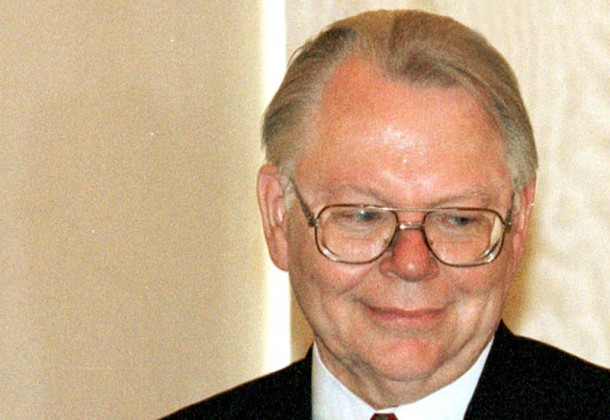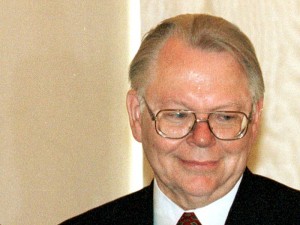Former Ambassador Says Russia Still Matters

Posted for The Patuxent Partnership
Pax II
By Jay Friess
Speaking at St. Mary’s College of Maryland last week, former Russian ambassador James Collins said the former USSR is now seeking independence from American influence and that its sheer size ensures that it will be an important player on the world stage.
Mr. Collins, now director of the Russia and Eurasia Program at the Carnegie Endowment for International Peace, was invited to speak Thursday by The Patuxent Partnership and the college’s Center for the Study of Democracy.
The Center’s director, Dr. Michael Cain, introduced Mr. Collins by recalling the time during the late 1990s in which Mr. Collins served as the United States’ representative in the new Russian Republic.
“There was an increase in Russian-American cooperation on a variety of issues,” Dr. Cain recalled.
However, Russia has recently very publicly opposed American efforts to quell the violence in Syria and create a missile defense system. It has also recently evicted the U.S. Agency for International Development (USAID) from the country. Presidential candidate Mitt Romney has labelled Russia the United States’ number one geopolitical foe. And less than half of the Russian public view the U.S. favorably, down drastically from last year.
Mr. Collins said that the relationship between the U.S. and its former Cold War adversary is “no longer that of another superpower, but that of a major power,” such as India or China. The Cold War defined how American foreign policy leaders viewed Russia, as a problem to be solved. Now that the Cold War is over, “why should Russia matter?”
“First, it’s just big,” Mr. Collins said. “We are engaged with Russia at almost every turn.” The country is America’s third closest neighbor after Canada and Mexico. “We really, in some sense, are territorial neighbors.”
Second, Mr. Collins said, “The nuclear world belongs, first and foremost, to Russia and the United States.”
Finally, he said, it’s appropriate that the periodic table of elements was developed in Russia, because, “They just have a lot of everything that’s on it.” Russia is the third largest exporter of natural resources, making it a major future trading partner with Europe and Asia.
Finally, Russia is increasingly engaged in world organizations, Mr. Collins said. Aside from its permanent seat on the United Nations’ Security Council, Russia is now a member of the World Trade Organization and other world economic councils.
He said the lessons of history teach that “America is better off cooperating with Russia than not.”
However, Russia is not always easy to understand or engage. The rule of President Vladimir Putin, Mr. Collins said, has brought Russian economic prosperity, but at the cost of government accountability and openness.
Still, America needs Russian engagement and cooperation in its geopolitical shift to defending Pacific allies and shipping lanes. “Not only is Russia important, but there are issues in which we know we will have to engage them,” Mr. Collins said.
This engagement needs to be that of a peer to a peer, not as an “older brother,” as it has been for the last two decades, Mr. Collins said.
“Russia has declared its independence from us,” he said. “Russia has said ‘no more.'”
Russia’s rejection of USAID and the Nunn-Lugar Cooperative Threat Reduction agreement are just symptoms of this desire to be respected as a peer, Mr. Collins said, adding that the United States needs to new view Russia as a relationship, not just a geopolitical problem. The relationship will now have to be more formal, and require more senior attention. The United States will have to hold Russia to its international agreements.
“This is not going to be a popular view,” Mr. Collins observed. “Russia is a high-maintenance case.”























